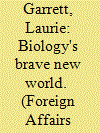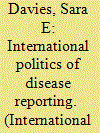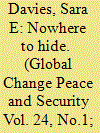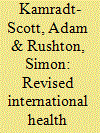|
|
|
Sort Order |
|
|
|
Items / Page
|
|
|
|
|
|
|
| Srl | Item |
| 1 |
ID:
124636


|
|
|
|
|
| Publication |
2013.
|
| Summary/Abstract |
In May 2010, the richest, most powerful man in biotechnology made a new creature. J. Craig Venter and his private-company team started with DNA and constructed a novel genetic sequence of more than one million coded bits of information known as nucleotides. Seven years earlier, Venter had been the first person in history to make a functioning creature from information. Looking at the strings of letters representing the DNA sequence for a virus called phi X174, which infects bacteria, he thought to himself, "I can assemble real DNA based on that computer information." And so he did, creating a virus based on the phi X174 genomic code. He followed the same recipe later on to generate the DNA for his larger and more sophisticated creature. Venter and his team figured out how to make an artificial bacterial cell, inserted their man-made DNA genome inside, and watched as the organic life form they had synthesized moved, ate, breathed, and replicated itself.
|
|
|
|
|
|
|
|
|
|
|
|
|
|
|
|
| 2 |
ID:
109873


|
|
|
|
|
| Publication |
2012.
|
| Summary/Abstract |
The International Health Regulations (2005) gave the World Health Organization a central role in collecting biosurveillance data and explicitly recognized the importance of human rights for the first time. Human rights and biosurveillance have a complicated relationship with one another though. Surveillance systems are necessary in order to arrest the spread of infectious disease outbreaks, but these same surveillance systems can be used in discriminatory ways. Is some sort of resolution or detente possible? This article investigates the role of the World Health Organization in implementing these potentially competing imperatives contained within the International Health Regulations (2005). To understand this relationship, it examines how the World Health Organization would implement the International Health Regulations in case of an international zombie outbreak.
|
|
|
|
|
|
|
|
|
|
|
|
|
|
|
|
| 3 |
ID:
137169


|
|
|
|
|
| Summary/Abstract |
The emergency–development continuum, also known as “linking relief, rehabilitation, and development” (LRRD), has been a conceptual, institutional, and programmatic preoccupation for aid organizations and humanitarian policymakers for well over two decades. The objective of this short paper is to introduce the idea of the emergency–development continuum and, only partly ironically, to advance the notion that we should not bother with it: operationally, it has done more harm than good, driving the work of humanitarian organizations in directions that run counter to the interests of the people they are trying to serve.
|
|
|
|
|
|
|
|
|
|
|
|
|
|
|
|
| 4 |
ID:
117025


|
|
|
|
|
| Publication |
2012.
|
| Summary/Abstract |
Since the outbreak of Severe Acute Respiratory Syndrome (SARS) in 2003, there has been much discussion about whether the international community has moved into a new post-Westphalian era, where states increasingly recognize certain shared norms that guide what they ought to do in responding to infectious disease outbreaks. In this article I identify this new obligation as the 'duty to report', and examine competing accounts on the degree to which states appreciate this new obligation are considered by examining state behaviour during the H5N1 human infectious outbreaks in East Asia (since 2004). The article examines reporting behaviour for H5N1 human infectious cases in Cambodia, China, Indonesia, Thailand and Vietnam from 2004 to 2010. The findings lend strong support to the claim that East Asian states have come to accept and comply with the duty to report infectious disease outbreaks and that the assertions of sovereignty in response to global health governance frameworks have not systematically inhibited reporting compliance.
|
|
|
|
|
|
|
|
|
|
|
|
|
|
|
|
| 5 |
ID:
109874


|
|
|
|
|
| Publication |
2012.
|
| Summary/Abstract |
Since the revisions to the International Health Regulations (IHR) in 2005, much attention has turned to how states, particularly developing states, will address core capacity requirements attached to the revised IHR. Primarily, how will states strengthen their capacity to identify and verify public health emergencies of international concern (PHEIC)? Another important but under-examined aspect of the revised IHR is the empowerment of the World Health Organization (WHO) to act upon non-governmental reports of disease outbreaks. The revised IHR potentially marks a new chapter in the powers of 'disease intelligence' and how the WHO may press states to verify an outbreak event. This article seeks to understand whether internet surveillance response programs (ISRPs) are effective in 'naming and shaming' states into reporting disease outbreaks.
|
|
|
|
|
|
|
|
|
|
|
|
|
|
|
|
| 6 |
ID:
109870


|
|
|
|
|
| Publication |
2012.
|
| Summary/Abstract |
This paper takes a constructivist approach to examining one of the new norms embodied in the recently revised International Health Regulations (IHR). The paper focuses on the provisions that seek to restrain states from applying disproportionate international travel and trade restrictions in response to a disease outbreak occurring in another country. This new norm, which aims to limit unjustified 'additional health measures', has significant implications for state sovereignty. Using the example of the 2009 H1N1 'swine flu' pandemic, the paper examines whether state behaviour and the discourse surrounding that outbreak supports a constructivist contention that a new norm has been created and that most states can be expected to comply with that norm most of the time. We conclude by discussing what the discourse over H1N1 suggests about the extent to which the new norm concerning additional health measures has been internalized by states.
|
|
|
|
|
|
|
|
|
|
|
|
|
|
|
|
| 7 |
ID:
188898


|
|
|
|
|
| Summary/Abstract |
This article critically examines the use of national border closures at the outset of the COVID-19 pandemic. After explaining why targeted border closures generally do not work and how they violated international law at the time, we examine the unprecedented case of total border closures. Positing that since the current instruments and institutions of global health governance did not anticipate this phenomenon, the legality of total border closures rests on less certain grounds. Then, after asking why nearly every government implemented some form of border closure in March 2020 if neither science nor law provided adequate motivation for their use, we conclude that in the face of a global health emergency, border closures represent an opportunity for political leaders to show determined action, redirect blame to other jurisdictions, and reinforce nationalism. We proceed to argue that both targeted and total border closures have profound legal, epidemiological, and political significance as performances that contradict global realities while undermining notions of global solidarity. Such political theatre means that citizens must weigh these consequences against any perceived benefits of border closures as they would any other politically driven government action, and contest and challenge them appropriately. Citizens must not unduly defer to scientists or lawyers on early COVID-19 border closures because these were primarily political—not scientific or legal—decisions. In this vein, we conclude with some guiding political considerations for scrutinizing government decisions to close borders and observations for the future of global health cooperation during infectious disease outbreaks.
|
|
|
|
|
|
|
|
|
|
|
|
|
|
|
|
| 8 |
ID:
188908


|
|
|
|
|
| Summary/Abstract |
This article critically examines the use of national border closures at the outset of the COVID-19 pandemic. After explaining why targeted border closures generally do not work and how they violated international law at the time, we examine the unprecedented case of total border closures. Positing that since the current instruments and institutions of global health governance did not anticipate this phenomenon, the legality of total border closures rests on less certain grounds. Then, after asking why nearly every government implemented some form of border closure in March 2020 if neither science nor law provided adequate motivation for their use, we conclude that in the face of a global health emergency, border closures represent an opportunity for political leaders to show determined action, redirect blame to other jurisdictions, and reinforce nationalism. We proceed to argue that both targeted and total border closures have profound legal, epidemiological, and political significance as performances that contradict global realities while undermining notions of global solidarity. Such political theatre means that citizens must weigh these consequences against any perceived benefits of border closures as they would any other politically driven government action, and contest and challenge them appropriately. Citizens must not unduly defer to scientists or lawyers on early COVID-19 border closures because these were primarily political—not scientific or legal—decisions. In this vein, we conclude with some guiding political considerations for scrutinizing government decisions to close borders and observations for the future of global health cooperation during infectious disease outbreaks.
|
|
|
|
|
|
|
|
|
|
|
|
|
|
|
|
|
|
|
|
|